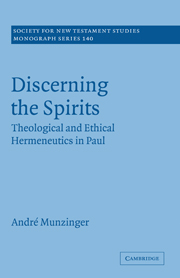Book contents
7 - Recapitulation and Implications for Theology
Published online by Cambridge University Press: 26 October 2009
Summary
My study began with a broad introduction into contemporary questions, which require discernment. Before addressing these questions below I need to summarise my conclusions. We set out by learning that Käsemann, Stuhlmacher and Beker place discernment at the heart of Paul's theology without clearly substantiating their claim. My thesis provides the evidence for these claims. I argue that discernment is existential theologising in which the ‘renewed mind’ (or ‘mind of Christ’ or ‘mindset of the Spirit’) takes on a constitutive role in constructing and verifying meaning. How does my work substantiate the basis for this assertion? In a brief overview I recapitulate the results of my thesis before returning to offer a summary of the contribution of this work. Finally, I will present some thoughts on the implications this study will have for theological deliberation in our time.
Recapitulation
Before focussing on the conceptual study of discernment I needed to review previous research which concentrated only on certain terms. Hence in separate sections I touched upon ethical and spiritual discernment, connected with δοκιμάζω and διακρίνω/διάκρισις respectively. At the same time I argued for their interdependence. With respect to ethical discernment I underlined its significance within Paul's ethics. My argument showed that the norms and traditions which were part of Paul's plausibility structure required discernment. For example, rather than concluding that the law offers a sufficient and binding standard, I argued for a form of wisdom which is anthropologically centred.
- Type
- Chapter
- Information
- Discerning the SpiritsTheological and Ethical Hermeneutics in Paul, pp. 191 - 196Publisher: Cambridge University PressPrint publication year: 2007



